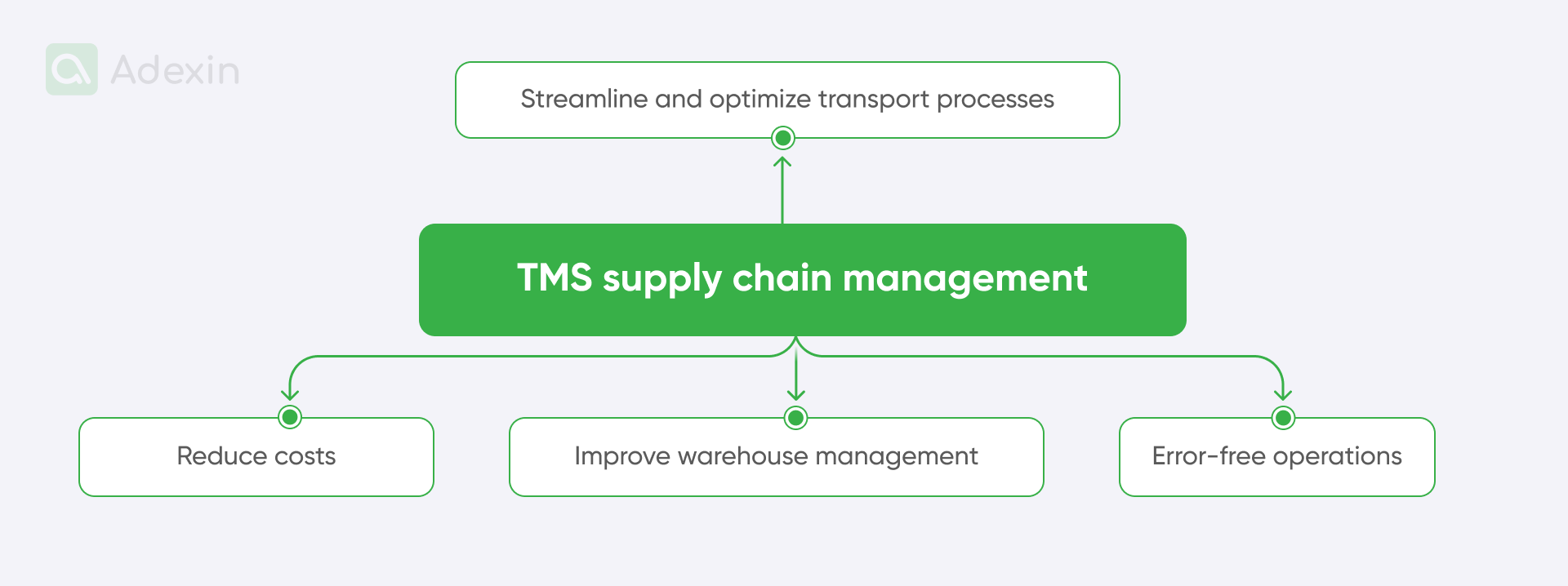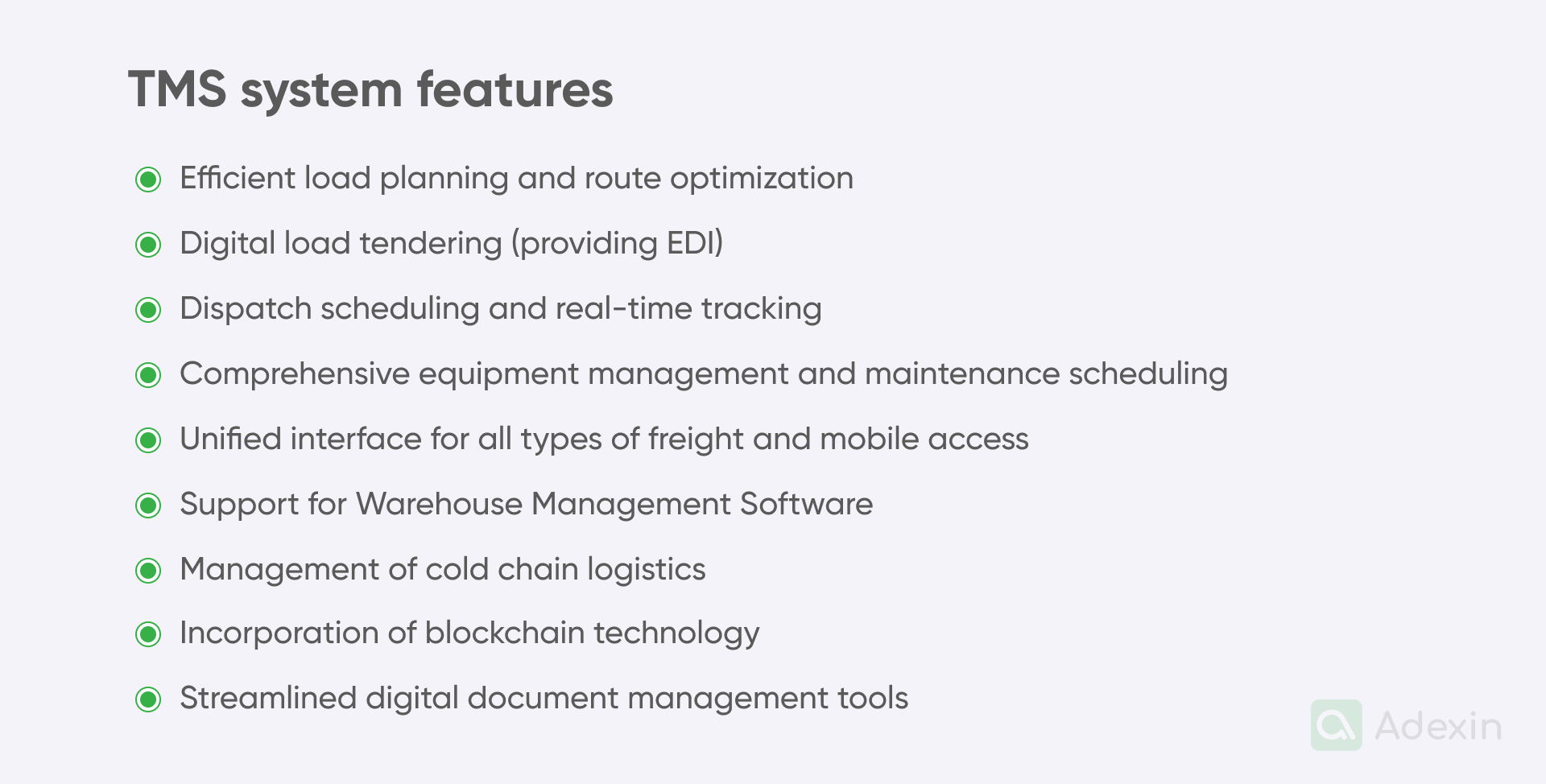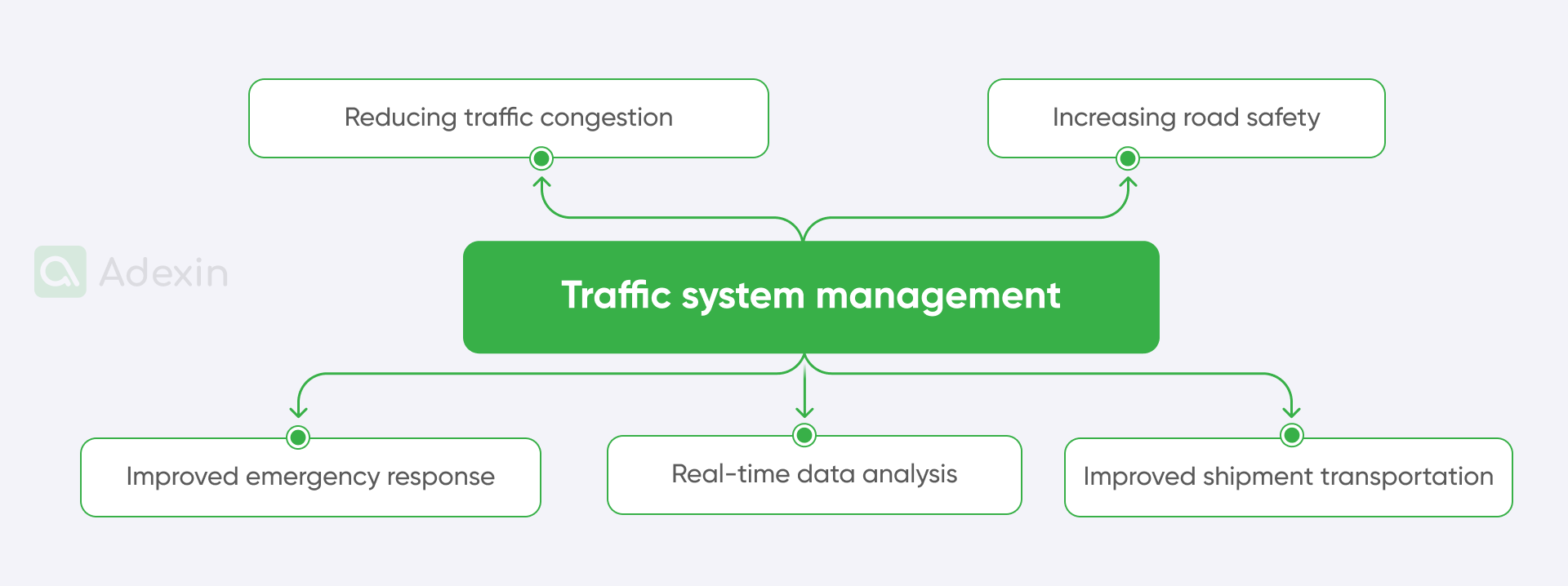Summary
Transport management solutions software (TMS) is an excellent tool for optimizing logistics and supply chain operations. It greatly benefits the business, such as cost savings and fast return on investment (ROI). Simply put, it makes your company competitive in today's logistics and transportation landscape. TMS is the best transport solutions software that provides ultimate added value within a short time frame. You can improve your supply chain with tailored features to specific needs by using custom software development services. TMS is a fundamental component of modern logistics. Let's see how you can improve the efficiency and control needed for successful supply chain management.
What is TMS supply chain management?
A transport management system (TMS) requires no special introduction for anyone in logistics. Simply put, TMS is a software system that supports fleet management operations by handling a substantial amount of data collected through various actions. Here are the areas where TMS has the most impact on operations:
Streamline and optimize transport processes
TMS helps adapt daily operations to optimize transportation in response to external events that can disrupt your fleet management
Reduce costs
There's nothing that reduces costs as effectively as the ability to track and trace performance daily, enabling agile decision-making. TMS provides comprehensive visibility into transportation.
Error-free pperations
TMS helps you maintain control over document flow, keeping an eye on ongoing operations through automated Electronic Data Interchange (EDI) and replacing email communication with automated updates.
Improve warehouse management
Whether it's a side effect or not, a good TMS can assist with smart inventory planning and efficient scheduling of space for loading docks and other supporting warehouse operations.
Increase control over ongoing processes
TMS is all about data collection, allowing you to gather the necessary information to run your transportation business more effectively.

Knowing this, we can move a bit deeper into the area where TMS really excels, which is Supply Chain Management (SCM). Even for those familiar with TMS, it might not be so obvious, but this system is a significant part of SCM. Using omnichannel as an example, we can clearly see where TMS plays a significant role in SCM.
As retailers shift to omnichannel distribution, they adapt to e-commerce by creating multi-channel systems. Distribution centers are concentrating on revamping their current approaches to transportation and delivery.
Consumers can now purchase items online with home delivery. This means they can order online and pick up in stores, buy in-store with home delivery, or simply buy in-store and take the parcel home (this mostly occurs when customers confirm upfront collection and payment at the store). These changes demand faster delivery and increased inventory in local warehouses. [1] This situation ultimately increases supply chain complexity, which requires a good TMS solution in place.
What are the two types of TMS?
TMS is the solution that can be deployed in transportation for carriers, freight forwarders, warehouses, and distribution centers. At first, we can divide TMS based on the available features. Not all TMSs have the full ability to enable all of the features in their operations.
Very often, logistics and transportation companies can purchase off-the-shelf TMS software that enables them only with basic features for fleet management. However, companies that want more sophisticated and competitive TMS systems and transportation solutions will contract custom software development services.
Here are the features of the TMS system:
Efficient load planning and route optimization
Digital load tendering (providing EDI)
Dispatch scheduling and real-time tracking
Truck driver's management and data retrieval from tachometers
Comprehensive equipment management and maintenance scheduling
Unified interface for all types of freight and mobile access
Advanced predictive analytics
Support for Warehouse Management Software (integration with WMS system)
Management of cold chain logistics
Incorporation of blockchain technology
Streamlined digital document management tools (integration with DMS system)
Off-the-shelf and custom-developed software define two types of TMS systems available on the market. Another two-way split for TMS involves installation on-premises and in the cloud. Here are the main characteristics of these two types of TMS:
Local TMS (on-premises)
TMS is located on the company's physical servers.
Provides control over data management and security.
Requires backup power and extensive Internet connectivity. Requires an internal IT team for maintenance (depends on contracts available in SaaS models).
Increases costs due to infrastructure and space.
Cloud-based TMS
TMS is hosted by a cloud service provider in a data center.
Requires leasing of server space.
Eliminates the need to manage physical servers
This can be a cost-effective solution, but if a company outsources to a cloud provider, there is a risk of non-compliance with data security regulations.

Functionality of traffic system management
TMS implicates various functionalities. Depending on what is important for your transportation business, you can choose optimal functions for your TMS. One of the most interesting functions, available mostly within custom software development services, is extensive traffic system management. Here, you can read about the characteristics of traffic system management built into TMS:
Reducing traffic congestion
TMS optimizes routes to reduce traffic congestion. Traffic management systems can improve overall traffic flow and environmental impact.
Increasing road safety
Traffic management improves road safety by monitoring driver behavior and ensuring compliance with safety regulations.
Improved emergency response
Traffic management builds into TMS and enables faster emergency response by tracking the location of vehicles and shipments in real time.
Improved shipment transportation (improved in transit)
Traffic management features ensure efficient transportation of cargo. It prevents delays and improves customer satisfaction.
Real-time data analysis
Traffic management can collect real-time data for better decision-making. Data can collaborate with other TMS functions.

How can carrier TMS improve your business?
The TMS system can influence all transportation operations in the supply chain along with better carrier management. It's obvious that when using TMS, you would also like to utilize the possibility of managing routes using various carriers. This function might also be available from off-the-shelf TMS software. However, regarding a more relevant option for your business, you may want to consider custom software development better suited to your environment.
Automated carrier inspection
Using carrier management by built-TMS function, you can accurately evaluate and approve transportation providers to reduce risk at both the carrier and freight levels.
Carrier portal
TMS can provide you with a carrier portal with a dedicated interface for seamless communication with carriers by using APIs or EDI.
Shipping documents management
You can manage all sorts of shipping documents along with carrier contracts. This feature in TMS can give you direct access to carrier rates and create contracts to simplify carrier selection for mini-offers or short-term contracts.
Multimodal optimization and visibility
You can monitor and oversee all resources across modes and carriers to improve the customer experience. Such a function in TMS is valuable if you're interested in cutting costs.
Components of the TMS supply chain
As we previously referred to TMS's impact on the supply chain in the omnichannel model, its purpose is much broader. TMS can support all components of the supply chain, where transportation plays a major role. Here are the supply chain components that TMS helps manage:
Planning
SCM begins with matching supplies to customer and production requirements. This is where the TMS enters the game. TMS is considering transportation demands for raw materials, equipment capacity, and personnel.
Sourcing
At this stage, it is necessary to ensure that raw materials meet production specifications. So, the TMS must support suppliers with transport modules that provide contingency materials.
Manufacturing
Raw materials are turned into final products, but products may still need to be transported to various locations for assembly, testing, inspection, and packaging. Here, TMS helps manage transportation by implementing just-in-sequence delivery, etc.
Delivery
Once products are ready, TMS helps manage the delivery of products to customers. It helps create robust delivery channels, including backup methods for unexpected disruptions and transport replacements.
Returns
SCM is also responsible for customer returns and logistics companies often implement reverse logistics. Here, TMS helps manage transport for returned products.
Running a smooth supply chain based on TMS freight
The aforementioned components are supported by TMS. Logistics and transportation companies can manage all freight transportation requirements by using TMS. Here are the most commonly known elements of freight transport where TMS directly helps manage day-to-day operations:
Air Freight
Fast and reliable air freight is ideal for time-sensitive or high-value goods. Air Freight can be cost-efficient thanks to a TMS, which can help logistics experts choose the fastest and most cost-effective routes.
Road freight
Versatile road freight is suitable for both short- and long-haul shipments. A TMS designed for road freight can help logistics professionals manage various factors, from route planning to load optimization.
Ocean Freight
Cost-effective and efficient transportation of bulk cargo over long distances can be managed via ocean freight. A TMS tailored for sea freight enables logistics professionals to optimize container bookings and monitor vessel or ship schedules.
Benefits of logistics transportation management solutions
TMS is unquestionably the best solution in its class when it comes to managing networks across the entire supply chain. For many effective managers, it's clear how their business can benefit from TMS. Nevertheless, the source of benefits can vary between those delivered by off-the-shelf software and those custom-developed.
We can clearly state that in both cases, your supply chain will receive a good solution that allows for better business operations in the supply chain compared to without TMS software.
We have compared the added value between commercial off-the-shelf (COTS) solutions and custom software TMS. Below, we outline the added value that can be delivered to your business beyond what COTS solutions offer, with customized features available from custom software development services.
Enhanced customer service
Modern TMS improves customer satisfaction by streamlining deliveries. Using custom-developed TMS, you can ensure your transportation business with more personalized service. That's the way you empower control tower employees with flexible features for rate calculation, invoicing, and a more tailored Electronic data interchange (EDI) process.
Improved warehouse efficiency
TMS optimizes warehouse operations by reducing manual tasks and errors. Custom software development allows for comprehensive management of warehouse operations, lowering the influence of all of the pain points with software solutions. This can include inventory space planning and enhanced dock loading area management.
Real-time shipment tracking
TMS enables real-time tracking for improved route planning. Custom features in software, such as real-time traffic monitoring and data exchange with tachometers, help predict road delays. This definitely leads to more accurate estimated delivery times (ETA).
Cost-effective shipping
TMS reduces shipping costs by optimizing routes and operations. Customized features built on top of the standard TMS software offer insights into the entire road network. It facilitates better fuel consumption planning and helps avoid costly delays.
Supply chain visibility and optimized routing
TMS provides transparency across the supply chain for faster issue resolution. Custom software development features provide a comprehensive view of your entire fleet whenever supply chain issues arise.
Reduced documentation
TMS reduces paperwork and costs. Customized TMS seamlessly integrates with Document Management Systems (DMS) and can even replace it for shipping documents. Custom software development enhances document workflows and incorporates Optical Character Recognition (OCR) technology for daily document digitization.
Quick outlook on the TMS Supply Chain
The value delivered by TMS to the supply chain is truly significant. Both transportation and logistics companies can benefit from it in various ways. The fact of the matter is that the size of the business doesn't diminish the value of TMS for the company. In the supply chain, everything is interconnected, regardless of the industry your transportation company represents. Whether you are a small logistics company or a growing transportation business, you can benefit from TMS at the same level.
Whether you require an extensive TMS solution for your business or not, you can still consider custom software development for TMS. This is the best way, in contrast to COTS solutions, to get exactly what you truly need for a fair price. Only businesses that rely on tailored services can expect substantial ROI in a short period of time.
Adexin has been delivering custom software development to the transportation industry. We help manage the supply chain in a more efficient way to bring instant value to your business. Get in touch with us, and let's discuss your business needs.
References:
[1] Automation in logistics: Big opportunity, bigger uncertainty; Retrieved from: https://www.mckinsey.com/industries/travel-logistics-and-infrastructure/our-insights/automation-in-logistics-big-opportunity-bigger-uncertainty
